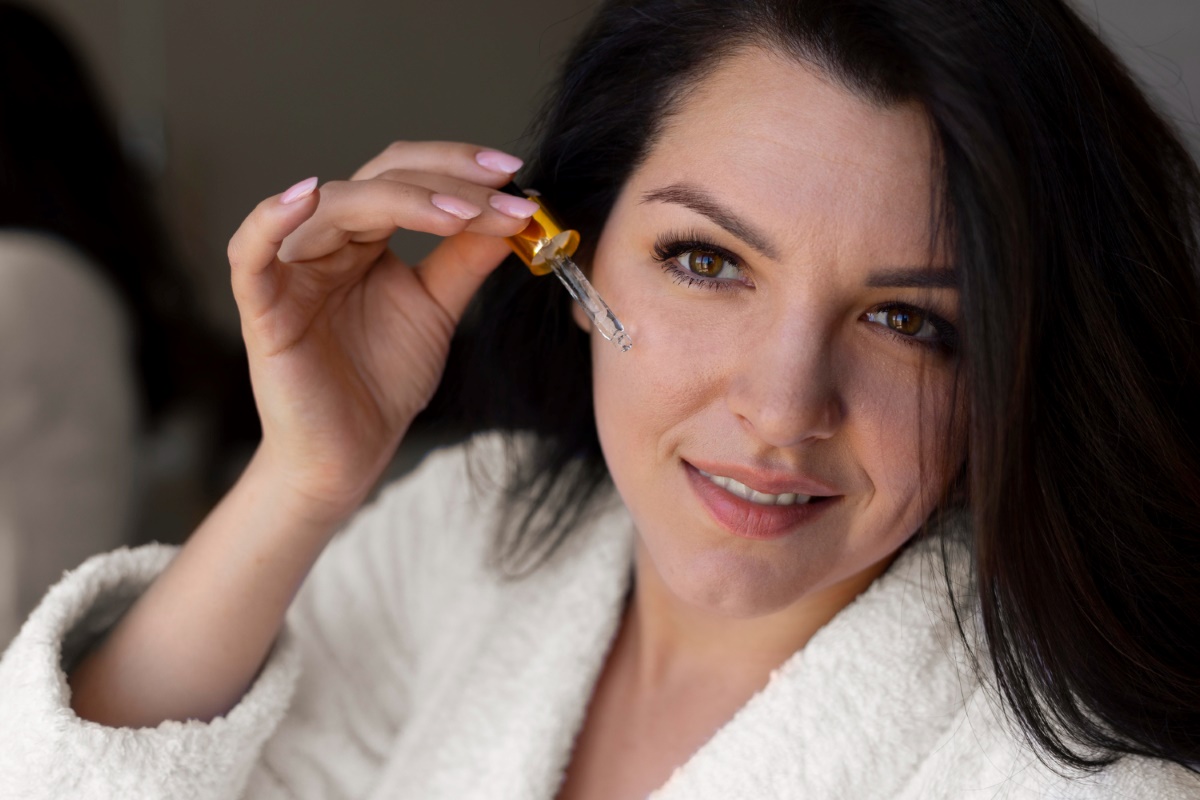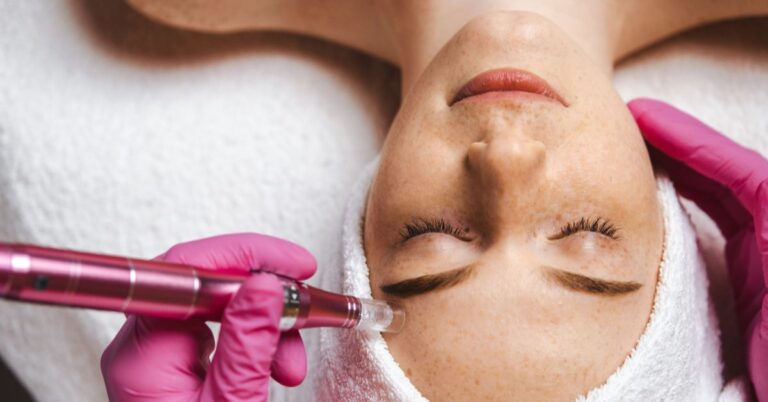Collagen is like the scaffolding that holds your skin up. It keeps your face smooth, firm, and elastic. But as you age, your body naturally makes less of it, and that’s when wrinkles, sagging, and dryness start to show.
You don’t lose collagen overnight. It fades slowly, starting in your mid-20s, and lifestyle habits can speed up the process. Sun exposure, poor diet, stress, and lack of sleep all play a role.
The good news? You can help your body make more of it with the right foods, habits, and care. No need for magic creams or expensive treatments.
So let’s break it down. In this guide, you’ll learn what collagen actually does for your skin, why you lose it, and the most natural ways to build it back up—step by step.
Table of Contents
What is Collagen and Why Is It Important for Skin?
Collagen is the building block that keeps your skin strong, elastic, and firm. It makes up about 75% of your skin’s structure and acts like the “glue” that holds everything together beneath the surface.
Inside your skin, collagen forms a dense network of fibers in the dermis—the layer right below what you see in the mirror. These fibers work like scaffolding, giving your skin shape, bounce, and the ability to stretch and snap back. Without enough collagen, skin loses its structure and begins to wrinkle, sag, and thin out.
It also plays a key role in how well your skin heals. When you get a cut or irritation, collagen rushes in to repair and rebuild the tissue. That’s why younger skin recovers quickly; it’s rich in collagen.
But the most important thing? Collagen affects both how your skin looks and how it behaves. It holds moisture in, smooths out texture, and keeps your pores looking tight. It’s what gives skin that plump, youthful look that no cream can fake.
As collagen breaks down with age or damage, these benefits fade. The skin becomes dull, loose, and fragile. So if your goal is healthy, glowing skin—not just now but long-term, protecting and boosting collagen is non-negotiable.
Factors That Affect Collagen Levels
Collagen doesn’t just fade with age; it breaks down faster when your daily habits and environment work against it. If your skin is losing firmness or bounce earlier than expected, one or more of these factors might be to blame.
Aging
Your body naturally produces less collagen starting in your mid-20s. This slow decline leads to thinner, weaker skin over time.
Sun Exposure
UV rays damage collagen fibers and speed up breakdown. Daily sun exposure without protection is a top reason for early aging.
Smoking
The chemicals in tobacco reduce blood flow to the skin and block collagen production, leading to wrinkles and sagging.
Poor Diet
A lack of protein, vitamin C, zinc, or antioxidants can limit the body’s ability to make or maintain collagen.
High Sugar Intake
Sugar attaches to collagen through a process called glycation, weakening the fibers and making the skin stiff and dull.
Chronic Stress
Stress hormones like cortisol can break down collagen and slow new growth.
Lack of Sleep
Skin repairs itself during sleep. Skimping on rest limits recovery and collagen rebuilding.
Environmental Toxins
Pollution, harsh weather, and chemicals in products can wear down the skin barrier and damage collagen over time.
Signs Your Skin May Be Losing Collagen
Collagen loss doesn’t happen all at once—it shows up slowly in the mirror. You may not notice it at first, but small changes in your skin’s texture, tone, and firmness can be early signs. Spotting them early gives you a better shot at protecting what you still have.
- Fine lines start to appear, especially around the eyes and mouth
These are often the first visible signs of collagen breaking down beneath the surface. - Skin feels thinner or more fragile
With less collagen, your skin loses thickness and becomes easier to damage. - Loss of firmness around the jawline and cheeks
Collagen gives skin its structure. When it fades, everything starts to loosen. - Skin looks dull or uneven
Collagen supports healthy cell turnover. Without it, skin can lose its glow. - Dryness or rough patches show up more often
Collagen helps skin retain moisture. Less of it can leave your face feeling tight and dry. - Pores seem more visible
As skin loses elasticity, pores stretch and become more noticeable. - Wounds or breakouts take longer to heal
Collagen plays a key role in skin repair. Slower healing can be a sign that your levels are low.
How to Naturally Boost Collagen Production
Your body can still make collagen; you just have to give it the right support. Small changes in everything from what you eat to how you live can protect what you have and help your skin stay firm, smooth, and strong. Let’s break it down.
Nutrition: Eat Your Way to Better Collagen
Protein-Rich Foods
Your body builds collagen using amino acids like glycine, proline, and hydroxyproline. These come directly from the protein you eat.
- Best sources: bone broth, chicken, fish, eggs, and lentils
Vitamin C
Vitamin C helps your body turn amino acids into collagen. Without enough of it, collagen production slows down.
- Food sources: oranges, strawberries, bell peppers, kiwi, and broccoli
Zinc and Copper
These minerals activate enzymes needed to build and repair collagen. A small deficiency can interrupt the process.
- Food sources: nuts, seeds, oysters, and sunflower seeds
Antioxidants
Antioxidants don’t make collagen, but they protect the collagen you already have from breaking down.
- Best sources: spinach, kale, blueberries, green tea, and dark chocolate
Lifestyle Habits That Support Collagen
Limit Sun Exposure
UV rays are a leading cause of collagen loss. Daily sunscreen matters more than you think.
- Use SPF 30 or higher, even indoors or on cloudy days
- Wear a hat or protective clothing outdoors
Don’t Smoke
Smoking reduces oxygen flow to the skin and weakens collagen. It also slows down healing and breaks the skin down faster.
Get Enough Sleep
Collagen repair happens at night. Poor sleep means slower recovery and weaker skin over time.
- Aim for 7–8 hours of uninterrupted rest
- Build a wind-down routine to sleep more deeply
Stay Hydrated
Water supports skin elasticity and helps collagen work better by keeping cells plump.
- Drink water throughout the day, not just at meals
- Include water-rich foods like cucumber and watermelon
Topical Products and Natural Treatments
Ingredients That Help
- Retinol and peptides
These trigger collagen production by speeding up skin cell turnover. - Vitamin C serums
Help protect existing collagen and support new growth by fighting free radicals. - Hyaluronic acid
Helps hold moisture in the skin, keeping collagen fibers stable and functional
Microneedling and Facial Massage
- Microneedling
Creates micro-injuries that trigger collagen repair naturally. Best done by a pro, but safe for home use with the right tools. - Facial massage
Boosts circulation and supports collagen by keeping skin oxygenated and toned.
Collagen Supplements: Do They Work?
Collagen Peptides and Powders
Hydrolyzed collagen (collagen peptides) may help improve skin elasticity and hydration. Your body absorbs these better than whole collagen.
- Look for types I and III (the ones found in skin)
- Choose products with added Vitamin C for better absorption
Natural vs. Synthetic: What to Look For
- Marine collagen comes from fish—good for skin, but may not suit all diets
- Bovine collagen comes from cows, rich in types I and III
- Choose clean-label brands, ideally with third-party testing
- Bonus if it includes hyaluronic acid or zinc for extra support
Conclusion
You don’t need perfect skin—you need healthy, supported skin that ages well. And collagen plays a major role in that. While you can’t completely stop collagen loss, you can slow it down and even support your body in making more of it. But results won’t come from just one product, one meal, or one treatment.
What truly works is consistency. Small daily choices—what you eat, how you sleep, and what you put on your skin- add up over time. Collagen isn’t a quick fix, and it doesn’t respond to hype. But if you support it from the inside out and protect it from daily damage, your skin will reward you with strength, bounce, and glow that lasts.
So forget shortcuts. Focus on habits. Your future skin depends on what you do today.


